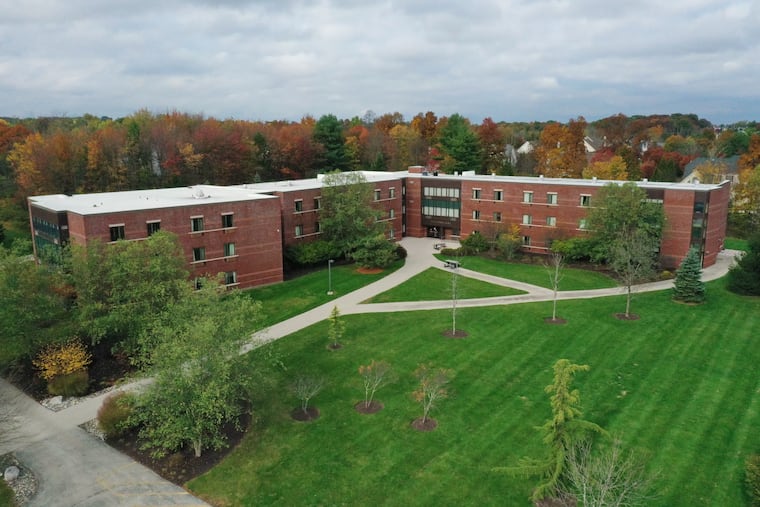St. Charles Borromeo Seminary moving to new home at Gwynedd Mercy University
The Lower Merion seminary, which is part of the Archdiocese of Philadelphia, has been looking for a new home for several years. The schools are not merging.

Saint Charles Borromeo Seminary will spend $10 million to buy a portion of Gwynedd Mercy University’s campus to establish a new home, Gwynedd and the Roman Catholic Archdiocese of Philadelphia said Monday.
The seminary, which sold its palatial Wynnewood property in 2019 for $43.5 million, continues to occupy the site under a lease.
The new campus will cover 15 acres on the northern border of Gwynedd Mercy’s property. The university occupies 314 acres on Sumneytown Pike between Routes 309 and 202 in Lower Gwynedd Township. The parcel being sold has two buildings, including a 204-bed resident hall.
As part of the agreement, the Maguire Foundation, a West Conshohocken-based private foundation that supports education here with an emphasis on Catholic institutions, will donate $3 million to Gwynedd Mercy.
“The Saint Charles Seminary community is thrilled to have found such a wonderful new home, and grateful for the generous support of the Maguire Foundation in making this transaction possible,” said Bishop Timothy C. Senior, the seminary’s rector.
St. Charles Borromeo and Gwynedd Mercy are not merging, and the extent of their affiliation will be worked out in the future, Senior said. The goal is for the move to be completed in time for the 2024-25 academic year.
St. Charles Borromeo had 147 seminarians at the beginning of the spring semester, Senior said. Its students come from 14 dioceses, mostly in the Mid-Atlantic, and from six religious congregations, such as the Vincentians. A person starting seminary after high school has a nine-year program of study before he can be ordained as a priest. It starts with four years as an undergraduate, followed by a one-year spirituality program and then four years of post-graduate studies.
Gwynedd Mercy had just under 3,000 students, including part timers, for the 2019-20 school year. It plans to add space at other dorms to accommodate students who would have stayed at Alexandria Hall, which is part of the sale, a spokesperson said.
The agreement with Gwynedd Mercy brings the seminary closer to a goal set in 2013 to reduce its footprint from the 75 acres it has occupied for generations at the intersection of City and Lancaster Avenues in Lower Merion. The seminary was founded in 1832 and moved to that location in 1871.
The initial plan was to vacate the college building that was built in 1928 and dominates the view of the property from Lancaster Avenue and consolidate on the back end of the campus. The strategy was to sell or lease 45 acres for development and keep 30 acres for the seminary, using money from a sale for renovations.
That plan, with a price tag of $50 million for the renovations, was too costly, Senior said during a January meeting of the Lower Gwynedd Township Board of Supervisors. That’s why, in 2016, the seminary decided instead that it would seek a new home at a local university.
The seminary in 2017 said it was exploring a potential affiliation with Neumann University, but no deal happened because the land, which the seminary would have acquired from Neumann’s sponsors, the Sisters of St. Francis of Philadelphia, was too expensive.
Meanwhile, the seminary sold its campus to Main Line Health in May 2019, but agreed to lease it back for up to five years.
Talks with Gwynedd Mercy began later that year. “We were excited about the possibilities of bringing two well-respected Catholic institutions of higher education together in one location,” Gwynedd Mercy University president Deanne H. D’Emilio said.
The availability of a dormitory was a big selling point for the seminary, Senior said.
The seminary said it plans to build a new chapel and student life center, which will include a dining hall, classrooms, library, administrative offices and fitness center, plus additional housing for seminarians and resident faculty. But it had no estimate of the cost.
The proposed move of the seminary received a enthusiastic reception at Lower Gwynedd supervisors’ meeting. “The fact that it’s moving here took my breath away when I first heard about it,” board chair Mark G. Grey said during that session.
At the end of June, the seminary had more than $50 million in cash and investments, but will need to raise additional money to fulfill its plans for the new campus and to build its endowment.
The archdiocese’s finances have been improving. Former Archbishop Charles J. Chaput launched a review of the seminary in 2012 as the archdiocese’s central financial office was contending with a nearly $18 million loss that year. Long-term deficit spending under Chaput’s predecessor had left the church in a financial free-fall.
Cost-cutting helped the archdiocese recover financially. Among the steps taken were headquarters layoffs and the sale of properties, including nursing homes, for $145 million.